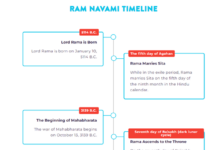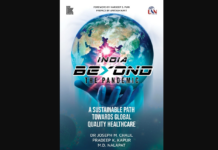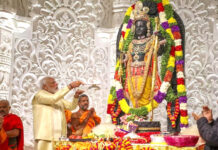
For Hindus everyday is Father’s Day as for us, Pitru Devo Bhav. We worship three father figures and pay our utmost respect to them. We start our day by paying of our respect to Para Brahma the Eternal Creator and Father of this universe, and the genetic father who gives us this precious life. Trinity, the three forms of Ultimate (Brahma, Vishnu and Mahesh) are also father figures.
Hindus begin their day by saluting these special figures for their blessings, love and protection. The fundamental idea behind this is to strengthen the parental bond by paying reverence to our fathers.
Firstly, our humble gratitude goes to Brahma who is the creator of the universe and of all beings, as depicted in the Hindu cosmology. Brahma is considered the father of the Vedas, the oldest and the holiest of Hindu scriptures and Hindu dharma.
Brahma exist more in scriptures in the form of a supreme power and treasure of knowledge and rays of enlightenment. Brahma presides over ‘Brahmaloka,’ a universe that contains all the splendors of the earth and all other worlds.
He is the “unchanging reality.” He is described as infinite, serene, invisible, imperishable, immutable, formless, one and eternal. He is in our hears rather than in homes and temples. In fact it is hard to find a temple dedicated to Brahma in India. Although Brahma is one of the Trinity, his popularity is no match to that of Vishnu and Shiva. One such temple is located in Pushkar in Rajasthan
Secondly, every early morning, we pay our salutation to Surya “the Supreme Light” also known as Adithya or Phra Athiti.
It is the chief solar deity in Hinduism.
Surya is the chief of the Navagraha, the nine Indian Classical planets and important elements of Hindu astrology.
Surya is also worshipped with most reverence for its life nourishing properties. The sun is important to all of us because it supplies us with light and heat and is the main source of energy on our planet. The sun’s gravitational pull is what holds the earth and all the other planets together. He is living in our hearts, homes and temples and taking care of us.
Father’s Day was created to complement Mother’s Day, a celebration that honors mothers and motherhood. Father’s Day is celebrated for over 100 years in the present Yuga. This is celebrated in many countries around the world, although at different times of the year.
In North America and the United Kingdom, Father’s Day is celebrated on the third Sunday in June. It is a celebration honoring fatherhood, paternal bonds, and the influence of fathers in society. Many countries celebrate it on the third Sunday of June, but it is also celebrated widely on other days.
Father’s Day is an occasion to express gratitude towards your dad for all his love and support. How to ride a bike, how to throw a baseball, how to drive a car. Dads never get enough credit for all that they’ve taught us. This Father’s Day thank Dad with a lunch or dinner on board the Napa Valley Wine Train.
The concept of celebrating Father’s Day is very new in India and has been imported from Western countries mainly US, perhaps less than a decade ago. However, it is remarkable to note that the idea of observing a day in honor of fathers has been appreciated by Indians to a large extent.
Today, millions of people in India observe Father’s Day on the third Sunday of June by expressing gratitude for their father or men who they revere as father figures. The practice to celebrate Father’s Day in India is quite new and can be witnessed only in metropolitan cities due to the influence of Western culture.
People always opt for various innovative ways to observe this special day and express their gratitude to their fathers. Sending Father’s Day greetings cards and Father’s Day gifts are some of the popular trends to celebrate the event. To observe the day several organizations and cultural societies also organize Father’s Day-themed cultural programs.
Pundit Anil Joshi






